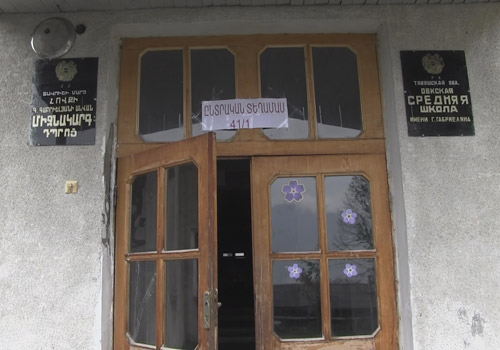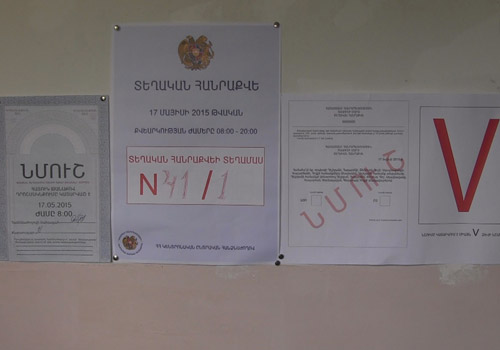The communities of Aghavnavank, Gosh, Dilijan, Haghartsin, Teghut, Khachardzan, and Hovk in the Tavush province of Armenia voted on Sunday, May 17, in the referendum on the Armenian Government's community enlargement program. However, outside of the communities set for unification people showed little interest in the issue. Epress.am reporters spoke to a number of residents of Ijevan, the administrative center of Tavush province, and found out that many were not even aware of the referendum; those who were said they did not care about it. To the observation that the current community enlargement program was only a pilot project, and subsequently their communities could be unified, too, people almost always responded by saying; “There are plenty of problems. We'll think about that when the time comes.”
A man well informed about the current events in the province, who asked not to be named, said that it was pointless to expect anything: the turnout in the referendum would be low since people expected nothing good of the authorities; besides, according to him, the referendum was actually meaningless because there is a political decision about the enlargement, and “they are not trying to hide it.” Another one of our interlocutors claimed that the communities would be unified even if no one voted for it in the referendum because “they've received a European grant and have to use it somewhere.”
Lack of interest
On May 17, the day of the referendum, we witnessed how the predictions of the previous day came true: the residents of the six communities did not want to be united into one to be named Dilijan. People did not have high hopes for the referendum, nor did they believe in the promises of a better life; the turnout was low because community residents were offended by the formal nature of the referendum. Vache Terteryan, First Deputy Minister of Territorial Administration and Emergency Situations, had earlier said that the results of the referendums in the communities were not essential for the final completion of the project: although in such cases referendums are imposed by the Constitution, the ultimate political decision still belongs to the National Assembly.
Uncertainty and unanswered questions
One of the reasons for the people's discontent was the uncertain nature of the enlargement program and the unanswered questions about it. Although Government representatives had visited the communities several times before the vote and, seemingly, explained why large communities were better than small ones, people said, none of their questions received a clear answer. The residents had realized that, first and foremost, it was important for the Government to cut costs by dissolving village administrations, and, in addition, to implement some projects with grant funds, such as, establish production units, where people from all communities would work.
However, the communities no longer take these promises seriously; as one of the residents of Haghartsin stated, “they have promised such things in the past, however, nothing has been done for the village.”
“There is nothing they have promised that our current village head cannot do,” he said, claiming that the money allocated for such projects usually “gets swallowed up by the authorities.”
Besides, the villagers had not been informed what specific projects could be implemented: “It says 'yes', 'no'. But we don't know what's being discussed. They say 'Vote, then we'll compile the projects',” a Hovk resident said.
Will the issue of transportation be addressed?
Another issue: how will the residents of the remote locations of the new community get to the new administrative center? According to villagers, based on the new program, there will be 1-2 persons in the areas dealing with bureaucracies, and there will not be a need to travel to Dilijan frequently. Residents of Gosh and Hovk, however, claimed that it could not be effective: first, these people are not always going to be able to answer all their questions, and they will still have to go to the center; besides, the locals did not believe this institute would last long. Some of them recalled that the village administration had implemented such practices in the past: once or twice a week they sent people from Ijevan to Berd and Noyemberyan to deal with the issues on the spot; however, at some point this practice disappeared.
We didn't need to ask for the opinion of the locals to understand the seriousness of the problem of transportation. The administration center is located 4 km away from the interstate highway, and the road to the village is difficult to pass: it was last asphalted in the 90s. In addition, there is no public transportation here. Hovk is located 27 km from Dilijan. 2 years ago there was a bus travelling from Hovk to Ijevan (17 km); today, it is out of service, too. For the villagers, who barely earn their daily bread, reaching Dilijan can turn into an insoluble issue.
Final loss of sovereignty
People in the communities want to make their own decisions at least sometimes. After the enlargement, they stated, this right would be taken away from them.
“Don't write my name, but I'm against [the enlargement]. Everything gets taken away from us,” a man of 60, who we met on the streets of Hovk, said. He alleged that their community would only have one representative in the council of the new community: “A larger village will probably have two representatives, but the council will mostly be composed of people from Dilijan. My problems will not interest them; none of the issues of Hovk will be solved, and these projects will mainly be implemented in Dilijan.”
Another resident of Hovk said that Government officials had not specified whether the liaison with the administrative center would be a local or someone from Dilijan: “The village head is from our village, he is familiar with everyone. He agrees, for example, when we ask to pay half of the land tax at the end of the month, with the salary. Who can I turn to with the same request in Dilijan? If I don't pay, I'll be fined.”
The issue of irrigation and drinking water is also a concern in the communities of Hovk, Gosh, and Haghartsin. There are no fixed fees or water meters in these villages: the residents have constructed an aqueduct themselves to convey water from the mountain springs; however, there are fees and meters in Dilijan, and the villagers are afraid they would be required to pay for the water in the new community.
“We were not told whether they'll put meters on our resources. Rumor has it that they will. Today, when someone has a problem with the pipes, the village head comes and fixes it with us. What will happen then? Do I go to Dilijan and ask the head of Water Utilities to come fix it?” a Haghartsin resident said.
There is also the issue of land allocation. According to the villagers community-owned land is already being sold without auctions. “And suddenly we see that someone from Yerevan is building a cottage,” a woman from Gosh said, expressing concern that the Mayor of Dilijan was not going to consider the opinion of the community and give the land to “outsiders.”
Dilijan is mainly “for”
Most of the residents of Dilijan have a favorable view on the program. We spoke to a few voters at the polling stations who said they were happy Dilijan would become larger. However, they were not able to answer the question “What would it give to the residents of the town?”.
Two young girls even tried to present the situation as a conflict between Dilijan and Ijevan. “These villages were ours. Ijevan took them away, and now we are returning them. We'll get to Ijevan, too,” one of them said.
Only one of the Dilijan voters expressed the opinion that the decision of unification did not belong to Dilijan and it was best left to the communities.
Dilijan and others
The referendum on the enlargement of the communities of Tavush province is doubly absurd. In Dilijan there are more voters than in all the villages combined: even if they vote against the enlargement, and Dilijan – for, the opinion prevailing in one community will be taken into consideration. On the other hand, Deputy Minister Terteryan's statement that the Government did not have to take into account the results of the vote.
For these reasons, the turnout in the villages was rather low. In Hovk, as of 1PM, out of 350 only 40 people exercised their right to vote. We were told that there were approximately 200 people with voting rights in the village; the rest were in Russia, and at best, only 40 percent of these 200 people would take part in the vote. We asked two young men standing not far from the polling station In Hovk whether they had already cast their votes; they said they did not intend to vote.
In one of the polling stations in Haghartsin, as of 3:45PM, about 250 people had voted out of the few thousand with voting rights.Villagers gathered in front of the polling station said they expected a turnout of no more than 350-400 people.
In Dilijan, where the majority of respondents opted in favor of the unification, we did not observe a flow of people to the stations either.
Thus, the Armenian authorities have once again “distinguished themselves”: in a poor country they spent money on an event, the outcome of which was known in advance, at the same time, completely depriving more than two dozen communities of their sovereignty.
Knar Khudoyan
Armen Melikbekyan
 Epress.am News from Armenia
Epress.am News from Armenia


